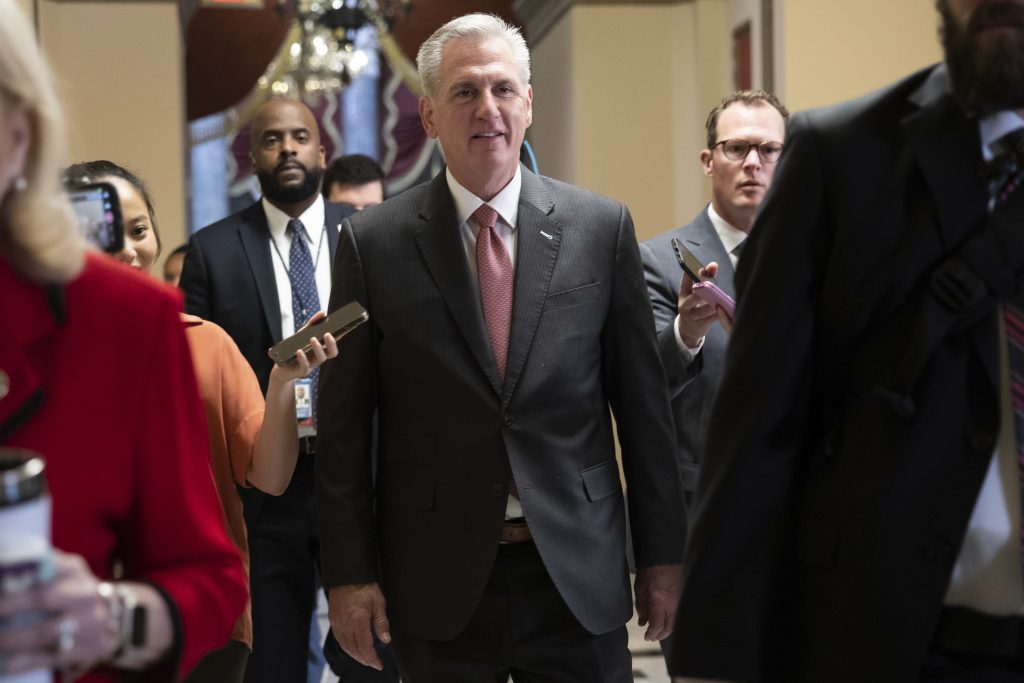As details leak about an emerging bipartisan debt deal just days before a possible default, House conservatives are growing increasingly unhappy.
With House GOP leadership revealing few policy specifics as talks continue, their lawmakers have sought information elsewhere. In this case, some GOP members are consulting a list — said to detail exactly where the negotiators have found common ground — that Rep. Tim Burchett shared with colleagues on the floor Thursday. The Tennessean, one of four Republicans to oppose the House GOP’s debt ceiling plan, declined to tell reporters where the list originated, but a Republican familiar with the matter said it came from leadership.
Among the details, according to that Republican: An agreement to lift the debt limit through 2024, a procedure in place to incentivize Congress to pass all 12 spending bills and a plan to claw back unspent Covid money. The two sides are also still working out the GOP’s demands for work requirements for certain safety net programs.
An aide to Speaker Kevin McCarthy did not respond to a request for comment on the list. When asked how many members saw the list, Burchett smiled and told reporters: “Next question.”
One of the concerned lawmakers was Rep. Ralph Norman (R-S.C.), a member of the conservative Freedom Caucus who has repeatedly stated he didn’t want anything less than what the House GOP passed as their debt plan last month.
McCarthy “doesn’t have the 218 on that unless he gets Democrats,” Norman said of the emerging proposal, noting he saw the list from Burchett. “If he gets Democrats, that’s a telltale sign.”
Rep. Bob Good (R-Va.) echoed Norman, citing concerns about “rumors” of a potential deal that would raise the debt ceiling for more money and more time than Republicans wanted — and “for a whole lot less in return that we need.”
“If that were true, that would absolutely collapse the Republican majority for this debt-ceiling increase,” he said.
The rising conservative angst over what could resemble a final deal is a preview of the intense whipping operation that GOP leaders will need to begin once they’ve locked down an agreement. While conservatives were always unlikely to support an agreement with Democrats, it’s a glimpse at the fury that could erupt on McCarthy’s right flank over a Biden-approved deal — and that anger could have lingering implications for the Californian’s speakership long after the debt crisis is defused.
Rep. Byron Donalds (R-Fla.), citing “some of the things that are being thrown around,” said he doesn’t see the point in discussing Congress passing 12 appropriations bills if “the spending is frankly too high.”
“I think if the speaker negotiates that with the President, the speaker will find out there’s a lot of Republicans who won’t be agreeing with the speaker,” he said.
Adding to the pressure they are beginning to apply, the House Freedom Caucus on Thursday publicly released a letter members sent to McCarthy, where they argued the current unity of the House GOP hinges on how he chooses to move forward: “As you navigate the debt limit debate, you are the steward of this [GOP] unity and will determine whether it continues to strengthen and places a historic stamp on this Congress or evaporates,” the Trump-aligned group wrote.
Conservative lawmakers argued for three “specific actions.” They wanted McCarthy pushing to include in any debt deal “additional provisions” to what was passed in the House GOP bill, called for the party to demand Treasury Secretary Janet Yellen share how she arrived at June 1 as the earliest date of a potential default and argued Republicans should pass a short-term agreement with limited cuts that would extend the debt ceiling through June.
For some rank-and-file Republicans, it’s no surprise their Freedom Caucus colleagues are threatening to jump ship as negotiations ensue. Those members argue it’s unrealistic to expect McCarthy not to deviate from the bill they passed; compromise logically requires some concessions.
Even if they won’t clearly state how they would vote, members like Norman and Good have said for weeks that they wouldn’t consider anything less than the House bill. The Freedom Caucus had released a different statement last week, calling for McCarthy to call off talks with President Joe Biden entirely, arguing it left the Senate no choice but to take up the House bill.
Since then, signs of disquiet among conservatives have continued to grow. Earlier this week, Rep. Chip Roy (R-Texas) argued in a closed-door conference meeting that the deal should be more about saving the country from reckless spending than getting an agreement. By Thursday, Roy — who had helped steer the House GOP’s debt plan to passage — signaled on a radio show that he would oppose any deal that resembled what he was hearing so far.
“That doesn’t sound like a deal that I can support,” Roy said on the emerging details, adding that his understanding was the deal being discussed only included “modest reduction” of the current year’s spending levels.
Asked by POLITICO about Roy’s concerns over debt talk direction, McCarthy replied: “I just think [members] just need to be updated.”
Similarly, House Financial Services Chair Patrick McHenry (R-N.C.) — one of the GOP negotiators — downplayed the veracity of leaks coming from the ongoing talks.
“Parts of the deal are rumors,” he said Thursday morning. “And that’s what happens with all these legislative negotiations because you have very few over in the White House, you have very many here, and many of you [reporters] here so everybody’s trying to get a little nuance of the story. But nothing’s done until you actually have a complete deal.”
Jordain Carney contributed to this report.



